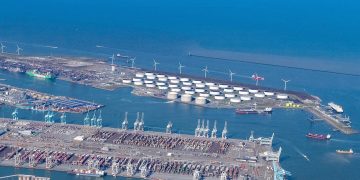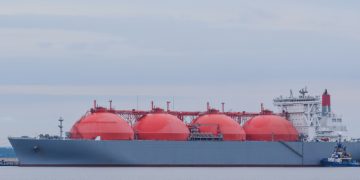NorthStandard P&I Club has published a guide on “Bulk Cargo Liquefaction and Dynamic Separation“, exploring the phenomenon and presenting best practices to mitigate its impact.
What is dynamic separation?
Dynamic separation occurs during a voyage where the moisture in the cargo rises to the surface of a stow as the cargo consolidates due to vibration and vessel motion. This is caused by a mechanism similar to liquefaction, but the cargo contains enough fine particles such that the void spaces between particles are very small and impede the moisture flowing through the cargo. As the water becomes pressurized and begins to flow, fine particles are carried with it and create a slurry.
Unlike liquefaction where a portion of the cargo in its entirety flows like a liquid, dynamic separation generates a slurry of water and fine particles which is driven away from the consolidating portion of the stow to areas of lower pressure and collects on the top of the denser (consolidated) portion of the stow. In response to vessel motions, this slurry has a free surface effect causing incremental shifting of the center of gravity in the hold, leading to a reduction of the vessel’s metacentric height (GM), negatively affecting the ship’s stability.
Differences between Liquefaction and Dynamic Separation
| Liquefaction | Dynamic Separation | |
|---|---|---|
| Definition | Cargo behaves like a liquid when the moisture content exceeds the transportable moisture limit (TML). | The moisture in the cargo rises to the surface during the voyage, creating a slurry of water and fine particles. |
| Cargo state | Entire cargo or significant portions flow as a liquid. | Slurry of water and fine particles forms on top of the consolidated cargo. |
| Cause | Excess moisture causes the cargo to lose its solid structure and behave like a liquid. | Vibration and vessel motion cause moisture to migrate to the surface, carrying fine particles with it. |
| Mechanism | Moisture saturates the cargo, reducing friction between particles, causing the cargo to flow. | Consolidation due to vibration and motion increases pressure, pushing water and fine particles to the surface. |
| Movement | Cargo can flow freely, potentially shifting within the hold and causing instability. | Slurry forms a free surface on top of the cargo, leading to shifting of the center of gravity. |
| Effect on ship stability | Can cause significant shifts in the center of gravity, leading to dangerous angles of list and potential capsizing. | Creates a free surface effect that incrementally shifts the center of gravity, reducing metacentric height (GM) and negatively affecting stability. |
| Detection | Requires monitoring of moisture content before and during loading. | Can be harder to detect as it develops during the voyage. |
| Prevention | Ensure moisture content is below the TML before loading. | Requires proper sampling and testing, and awareness of the cargo’s condition throughout the voyage. |
| Examples of affected cargoes | Iron ore fines, nickel ore, bauxite. | Similar to liquefaction-prone cargoes but more influenced by the presence of fine particles and vessel motion. |
What are the consequences?
Cargoes that lose stability and flow due to liquefaction or dynamic separation have similar negative consequences for the ship. The effects may produce dangerous angles of list, and in some instances, the resulting loss of stability can be so severe that the vessel and the lives of those onboard are lost. It is therefore imperative that crews are aware of the types and conditions of cargo prior to loading that may give rise to either phenomenon.
How are these cargoes classified?
In the IMSBC Code, cargoes that can liquefy or dynamically separate are classified as Group A cargoes. The IMSBC Code 2022 definition of a Group A cargo is: “Group A consists of cargoes which possess a hazard due to moisture that may result in liquefaction or dynamic separation if shipped at a moisture content in excess of their transportable moisture limit.”
SOLAS requirements
The International Convention for the Safety of Life at Sea (SOLAS) Chapter VI – Carriage of Cargoes – provides the general framework for the carriage of all cargoes.
Shipper’s duties
In respect of cargoes with particular hazards, such as liquefaction or dynamic separation, SOLAS requires the shipper to provide the master, or his representative, with the appropriate cargo information sufficiently in advance of loading to enable the necessary precautions for safe carriage to be put into effect. The format of such information is provided in the IMSBC Code 2022 Section 4.2.3. A typical form for the shipper’s declaration is also included in IMSBC Code 2023 Appendix 5.
Additionally, there are specific provisions for additional information to be supplied for Group A cargoes in the form of a certificate of moisture content and transportable moisture limit (TML). As such, shippers are obliged to provide appropriate cargo information to the master prior to loading. To obtain this information, the shipper must arrange for the cargo to be properly sampled and tested. Physical property tests on the cargo are meaningless unless they are conducted on truly representative samples prior to loading. If such information is not given, the master should not accept the cargo for loading.
Master’s duties
Section 7.3.1.1 of the IMSBC Code states: “Group A cargoes shall only be accepted for loading when the actual moisture content of the cargo is less than its TML.” Therefore, a master should not accept such a cargo for loading without first receiving the appropriate documentation certifying the moisture content and TML of the cargo, with the moisture content shown to be less than the TML.
































































































































